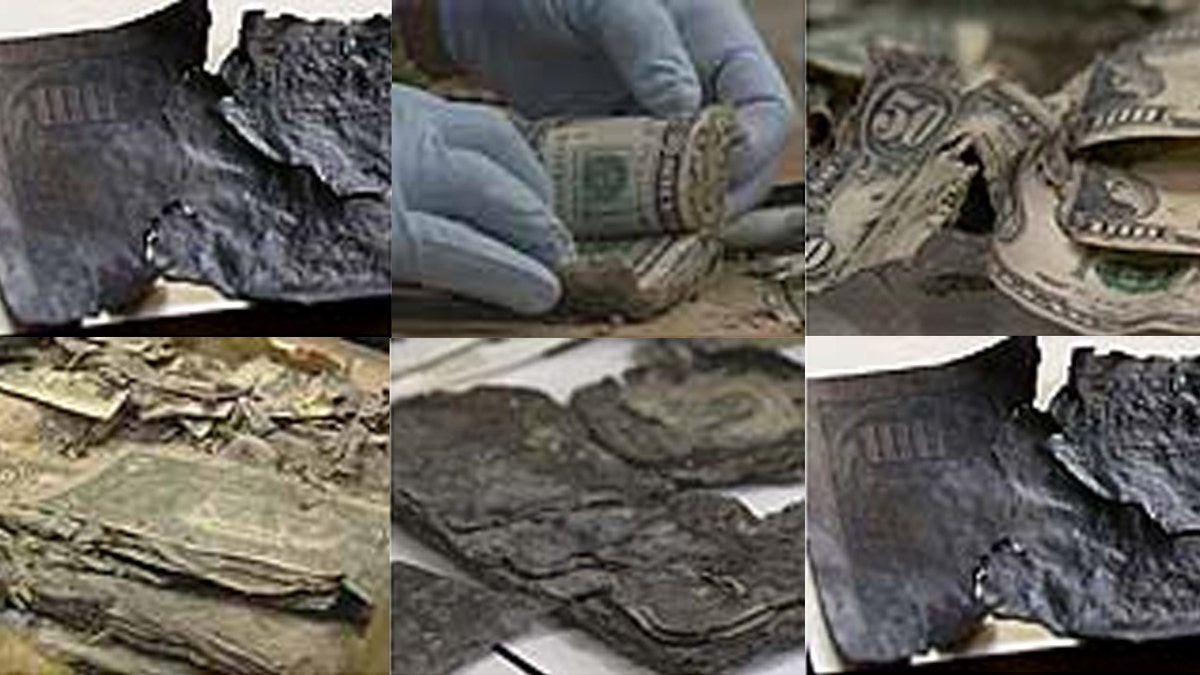
Images courtesy U.S. Bureau of Engraving and Printing, Department of Treasury.
In the late spring of 2012, federal agents seized more than $4 million in cash that had been sent by Argentina’s Banco Piano to the Mutilated Currency Division at the Bureau of Engraving and Printing (BEP) for reimbursement.
The money, mostly in $100 bills, immediately set off alarm bells. In a May 2012 filing requesting a warrant to seize the cash, Warren Buckley, a special agent in the Secret Service, noted that a lot of the bills Piano had sent were burned or water-damaged in ways that can signal money laundering and other illegal activity.
“I have a client who has a normal-looking living room, but inside the bricks there are bills - he must have $1 million or $1.5 million in there."
“BEP experts consider it highly suspicious,” he wrote, “when two different mutilated bills, each submitted for redemption at a different time in different packages, have remarkably similar or the same burn marks and charring pattern.”
According to Buckley, the money from Argentina also contained 1,831 bill fragments – sometimes the only thing connecting the fragments was that they had been taped together. This is often the signature of a scam known as “2-to-3 fraud,” in which portions of two bills are passed off as the remnants of three bills.
It was enough to persuade a judge to approve the seizure and begin a legal action (U.S. v. $4,245,800 in Mutilated United States Currency) that was settled two months ago. During those proceedings, Banco Piano president, Alfredo Piano, pointed out that Argentines are world-class hoarders of dollars. In fact, in a 2006 U.S. Federal Reserve report, it was estimated that about $50 billion – one out of every nine dollars circulating abroad – resided in Argentina.
The reason is simple, according to Bloomberg News: Because of the runaway inflation afflicting the local peso, on the black market dollars are worth about 60 percent more than the official exchange rate. And people frequently stash those bills at home, in desks and mattresses, in nooks and crannies — wherever they can because the Argentine government has in the past forced banks to convert dollar accounts to pesos.
“There’s nowhere to save dollars, so people bury them in the ground in a box, or put them in the attic,” Piano told Bloomberg. “I have a client who has a normal-looking living room, but inside the bricks there are bills — he must have $1 million or $1.5 million in there.”
Piano also pointed out that bills get damaged more often in Argentina because “in a person’s house [the bills] catch fire and burn.” He recounted that after last April’s flood in La Plata, “a huge amount of wet bills” came in.
And there may be less tragic reasons for the mutilated bills, too. “There are lots of people who have dogs,” he said. “They have puppies that begin to play and tear everything.”
Matthew Herrington, Piano’s lawyer for the suit, said that U.S. authorities telephoned several of the people on Banco Piano’s exchange lists to check their stories. One man contacted by officials “had $60,000 built into his wall, and he had a pipe burst,” Herrington said.
The man didn’t immediately realize that his stash might be at risk and, when he opened the wall to check, according to Herrington, “of course, the money’s all molded up.”
Banco Piano, which grew from an exchange house that provided remittances and paycheck advances to foreign workers into a full-service bank with more than 30 locations in Argentina, has been sending mutilated cash – $2 million to $3 million a year – to the U.S. for six decades or so. The bank makes about 10 percent of its income from the commissions it charges.
As part of the settlement, which was reached toward the end of 2013, Banco Piano was reimbursed for all but $202,600 of the mangled dollars, much of which was deemed to be 2-to-3 fraud.
“They can say what they like but we don’t do that,” Piano told Bloomberg. Still, he was clearly relieved. “Among millions and millions of dollars,” he said, “$200,000 is nothing.”
Follow us on twitter.com/foxnewslatino
Like us at facebook.com/foxnewslatino








































